Dancing in the streets of TNS - Life with Wales' most successful club
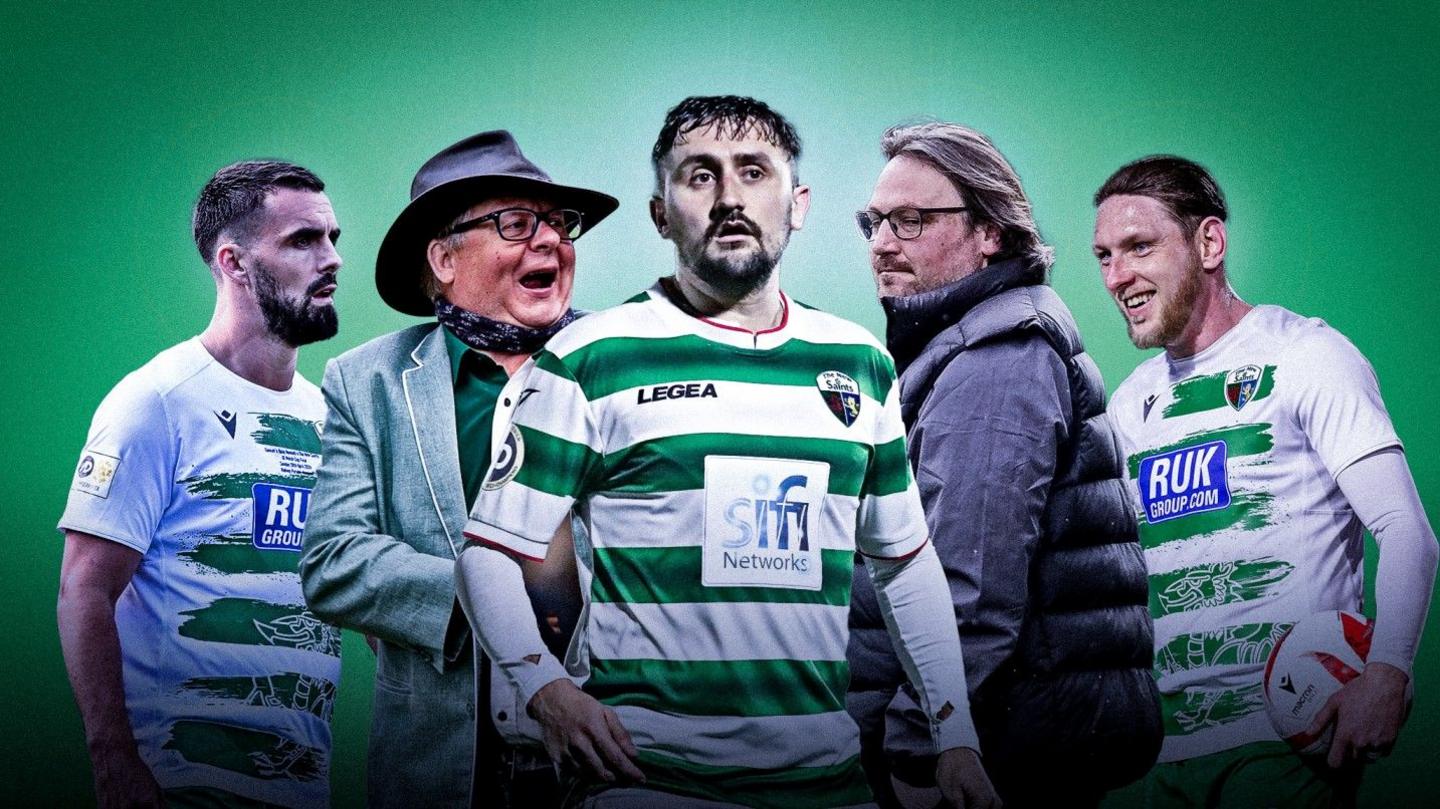
The New Saints have won the Cymru Premier in each of the past three seasons
- Published
They’ve been dancing in the streets of TNS for quite a while now.
As staff pause for a coffee, on display around them is a bounty of silverware for the September’s sunlight to catch, reflecting a two-decade dominance.
On a proud plinth in one corner of the glass-walled communal function room stands the Cymru Premier trophy, a title won six months earlier, theirs for the 16th time after an undefeated season.
One by one, players begin to slowly arrive, entering through the same corridor fans will later also walk through in readiness for the afternoon’s fixture against Barry Town.
On the way, they both pass photographs of the side lining up against Manchester City in the first game at the Etihad, of a captain’s handshake with Liverpool’s Jamie Carragher, of Legia Warsaw’s flag and pyro-waving ultras, and of various green-shirted celebrations on the continent. A pictorial potted history of European nights. Soon there may well be more images, illustrative of becoming the first side from the Welsh pyramid to reach the group stages of a Uefa competition.
Because even if the green sign above the doorway hadn’t told you, this is Park Hall, home to The New Saints, or simply TNS for short. Either way, it is Welsh football’s most successful football club.
Arguably, its most controversial too.
The flagbearers who found a home in England.
'They were great days back then'
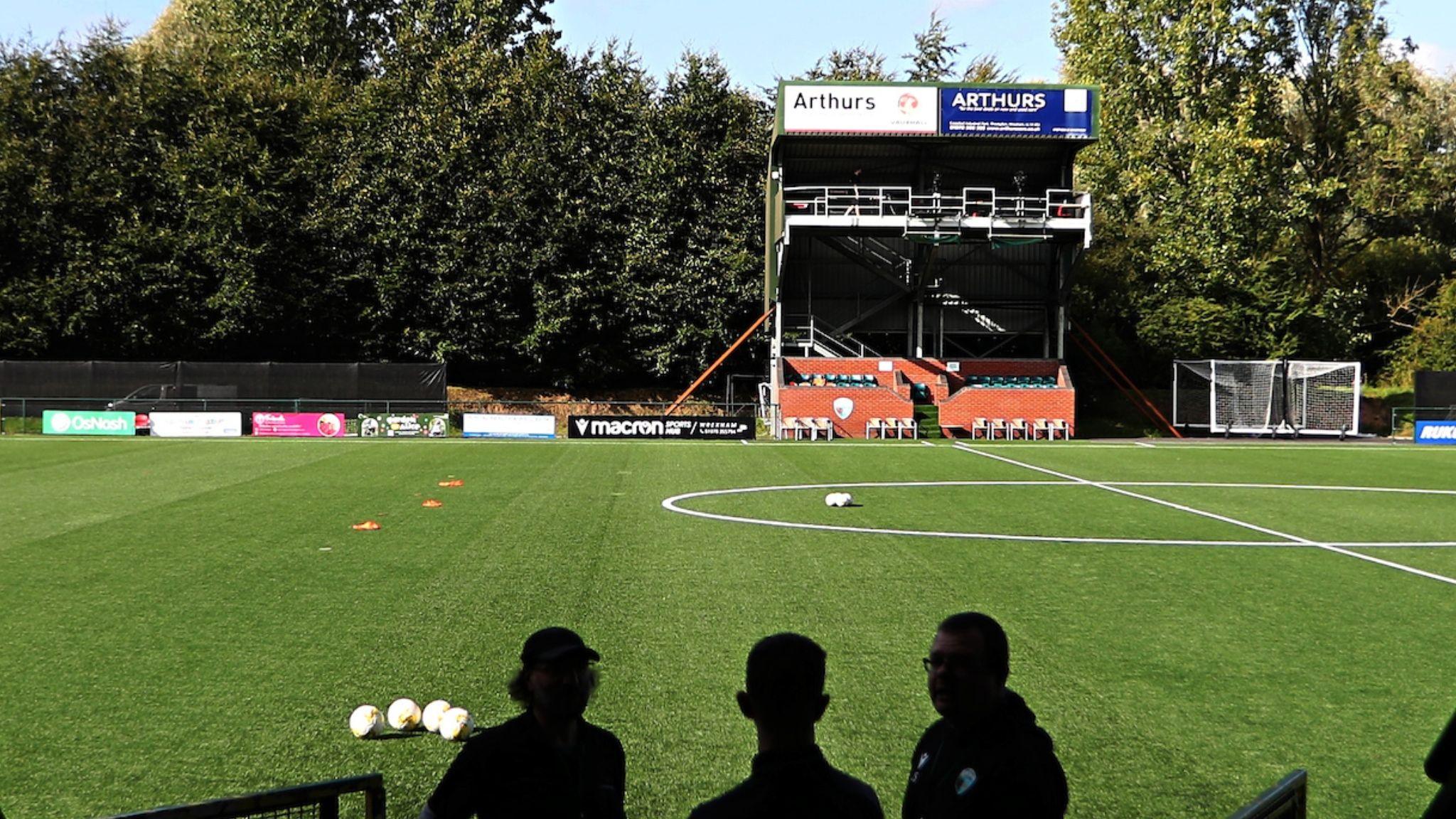
“Which club do you mean?” says one of the men taking a break from tending to the green as they ready it for winter.
Around 10 miles south west from Oswestry and Park Hall, crossing the border along the way, the retirement-aged group are standing at the entrance to the bowls club in the village of Llansantffraid-ym-Mechain, looking out to the car park they share with the local football team.
To their right is the social club of the third-tier Llansantffraid Village FC, the club founded in 2007. The ground, tucked away next to a school, with one small stand behind the goal and another partially along one touchline, is Treflan - the same home ground that the champions of Wales once called theirs.
There are monuments to that time, the floodlights and the gantry, all remnants of the investment beyond a club of a village of around a thousand people.
“What the club have done now is fantastic, getting into Europe, and I do keep an eye out for their results, but they were great days back then, the atmosphere we used to have here,” says another of the group, recalling the time of full crowds and a community buzzing with the unlikely success.
Rising up to the top tier, a part-time team of electricians, locals and the like, the ‘original’ Llansantfraid had won the Welsh Cup in 1996, beating then all-conquering, full-time Barry in the last ever football game at the old National Stadium, reaching Europe for the first time in the process.
“It was a proper community club and it was a massive story, real rags to riches,” says Graham Breeze a few days later, the team’s manager in that era who combined the role with his job of editor of a number of North Wales newspapers; someone clearly used to writing his own headlines.
“It was a great achievement for a club that could barely afford kits and had to rely on donations from committee members.”
That would change – as would the name of the club – and the start of trophy after trophy, all after a phonecall that eventually led back up the 10 miles to Oswestry.
Before that journey, one of the group prepares to return to the tools. “TNS? They can go to hell as far as I’m concerned.”
The Italian Job
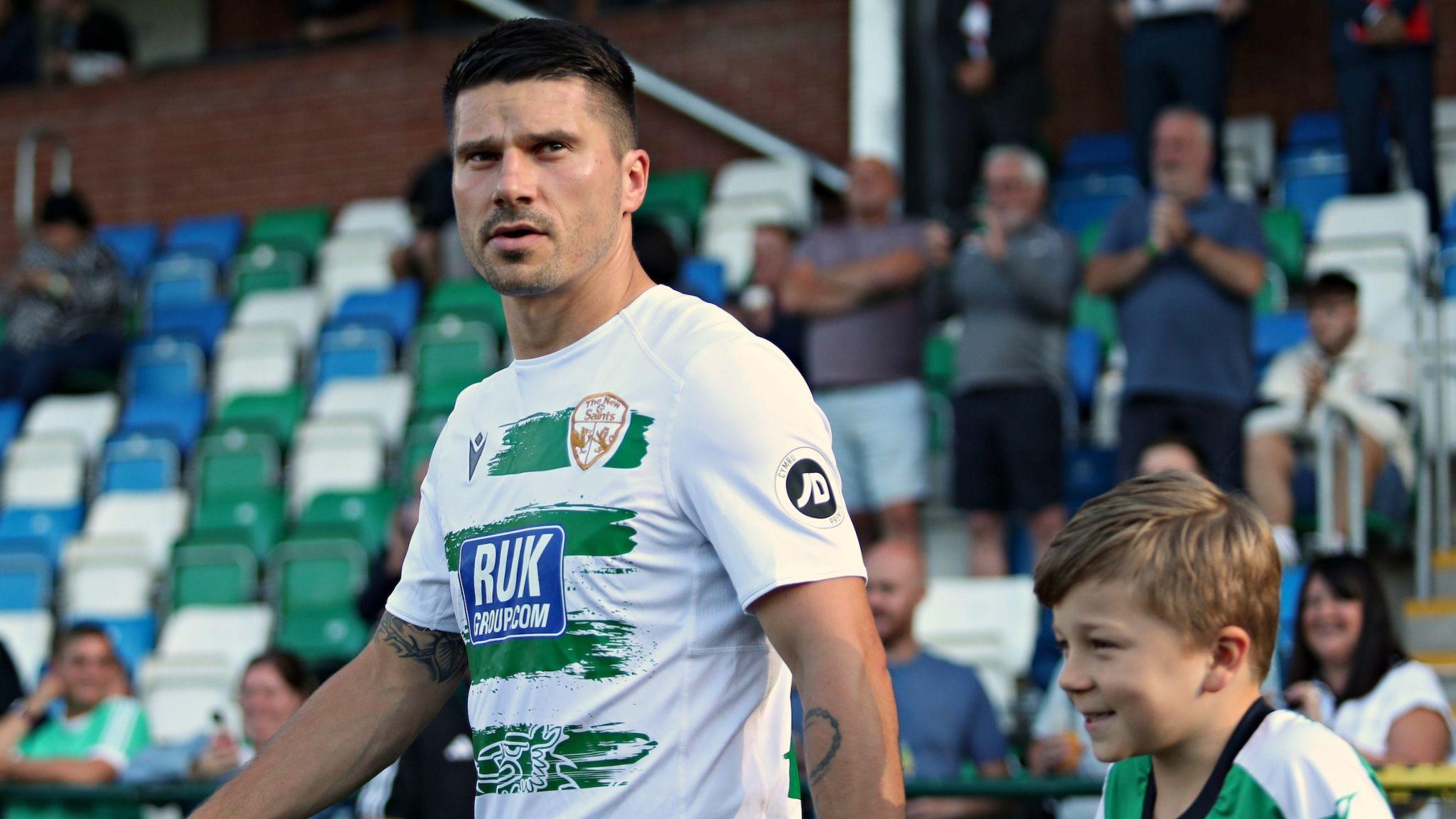
Craig Harrison is planning his own journey. Italy is on the mind of the TNS manager as he steps through the French doors back into the function room having cast his eyes over the Park Hall pitch.
TNS’ first group opponents are Fiorentina, finalists for the past two years, and the former Middlesbrough and Crystal Palace defender will be heading to watch their Serie A game with Lazio. Scouting trips for Panathinaikos and others have already been divvied up between assistants and coaching staff, although he admits they are scrambling for tapes of Kazakhstan’s Astana.
It is not new for the imposing but softly spoken Geordie. His first spell had seen him break Ajax’s 44-year world record for consecutive victories; the second has seen two titles, two cups and two finals in two seasons.
With the biggest budget in the league by some way, success is deemed by most to be a given. But, making the most of their full-time status, it’s also earned.
“You still get that buzz,” the 46-year-old says. “You wouldn’t do the extra otherwise, you wouldn’t make the sacrifice where your family misses out. It’s those extra bits that go unseen, but you always wonder if that extra bit of analysis is what the other side haven’t done, is that the difference between us winning and losing.”
Similar amounts of preparation has gone into today’s opponents. As volunteer PA announcer David Figg – introduced simply as Statto – informs, Barry were the last team to take points away from Park Hall, more than a year ago.
“I had them back in on the Sunday at 9am,” chuckles Harrison saying players won’t need a similar reminder. “Not because we didn’t win, but because we were sloppy after being 2-0 up with five minutes to go. It’s about standards”
There is still plenty of time to play at Old Trafford.
“It’s still 0-0,” says winger Adrian Cieslewicz, as he lifts his head away from the mobile phone.
Manchester United are playing in the Premier League’s lunchtime game.
The Pole, brought up in the Faroe Islands, and speaks with a hint of Scouse, is a United fan, despite starting out in Manchester City’s academy.
Once of Wrexham – pre-Ryan Reynolds – he has been with TNS for 10 years. The winger tells of the improvements in the league over that time, but how he would love to see bigger crowds. Little more than 300 are expected at Park Hall that afternoon.
“But hopefully that will begin to change, especially with these European games,” he says. “It’s taken a long, long time, but it’s been good to be able to repay all the work and investment 20 years later. To be fair to the owner, he always said it would happen.”
Outspoken and outlandish - TNS 'shrewd' owner
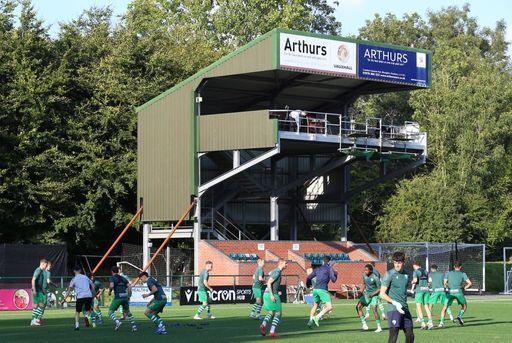
“How to sum up Mike Harris in one word? Crazy, probably.”
Ian Williams has been running through the staff numbers at Park Hall these days.
The 27 playing professionals as the only full-time club in the Cymru Leagues is one thing, but then there are the 16 football staff, such as the management and coaching team, some of whom double-up with roles in a flourishing academy that runs 10 teams, the seasonal staff in the community foundation, while the women’s team have recently turned semi-pro - only one year later than Cardiff, Swansea and Wrexham – as they attempt to compete with the English Football League trio in Wales’ Adran Premier.
Then there are the operational staff - five full-time in total – including Williams, now the club’s chief operating officer having first arrived in 2003.
“Unrecognisable,” is how he describes the difference, not just about the 2007 move to Oswestry and the £3m Park Hall facility that has only last season seen an £800,000 upgrade for a new stand to bring the ground up to Uefa standard for qualifying games.
Plus there are the volunteers who have begun to join the players taking seats at tables; the investment and spending at the club may be grandiose for this level, but this is still grassroots football.
But, for all the people at the club, as far as most are concerned, the club is synonymous with one alone: the club’s financer and figurehead.
Mike Harris’ bankrolling of TNS has been as big as his opinions for 27 years in Welsh football. It has brought success, and plenty of headlines. Outspoken, outlandish at times, and has ensured his team have been out on their own.
There are doubts whether he will make today’s fixture as he travels back from the US where he has built a new company that includes some blue-chip companies as clients.
“He’s the type of person is always thinking ‘What can I do next, what can I do that’s different?’,” Williams says as he continues his description of the club’s chairman and owner.
“Don’t get me wrong, there are times where he comes up with something and you think ‘Oh God, no’, but then you start talking it through and think about it and you realise where he’s coming from.
“He’s underestimated. He’s shrewd – and he doesn’t care what people thinks because you don’t achieve what he has in life and business without that self-motivation.”
As the club’s photographer finishes setting up his laptop and puts on his bib, Williams suggests he’s a perfect person to ask about Harris.
“His skill is seeing things other people don’t,” says Brian, who happens to be the owner’s brother-in-law. “You just have to put up with some of the nonsense in-between.”
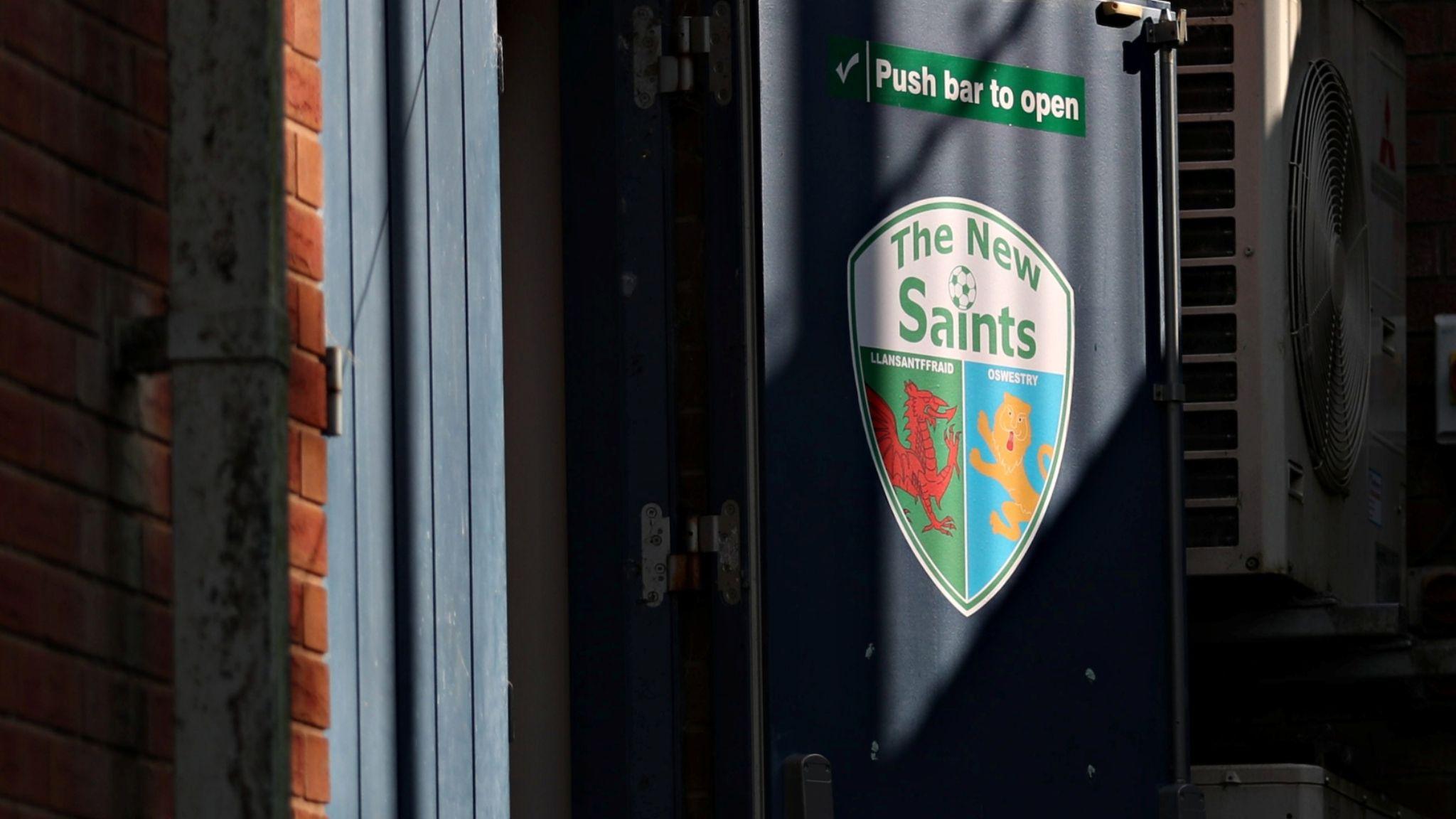
“He had already spotted something, to his credit,” recalls Breeze about that first phonecall back in 1996.
Llansantffraid were playing Ruch Chorzow of Poland. Looking for a shirt sponsor, Breeze spoke to a someone he knew from Welshpool who had started up his firm Total Network Solutions six years earlier on the cusp of the data age.
A keen football fan, but more specifically a businessman, Harris paid £10,000 to have his company’s name feature on the chests of players in local newspaper and highlight snippets.
But, struck by how much coverage the league’s results got both inside and outside of Wales, an idea had been sparked.
When the call came to renew, Harris declined before the throwaway offer to ‘come back to me if you ever fancy changing the name of the team’.
Within a few hours, the call Harris wasn’t expecting was returned about what the deal would look like. By the time the new season started, Llansantffraid were now Total Network Solutions FC – for the sum of £250,000 over five years.
Cue Jeff Stelling’s quip over the name as the vidiprinter validated that initial promotional idea. TNS were born. Within three years, they were Welsh champions. Further titles and transformation was to follow.
“You have to remember, with the investment and vision, he did a lot of good for the club,” adds Breeze. “But there were always going to be people who didn’t like what happened. It split the club and left a bit of sour taste.”
Cracking the code
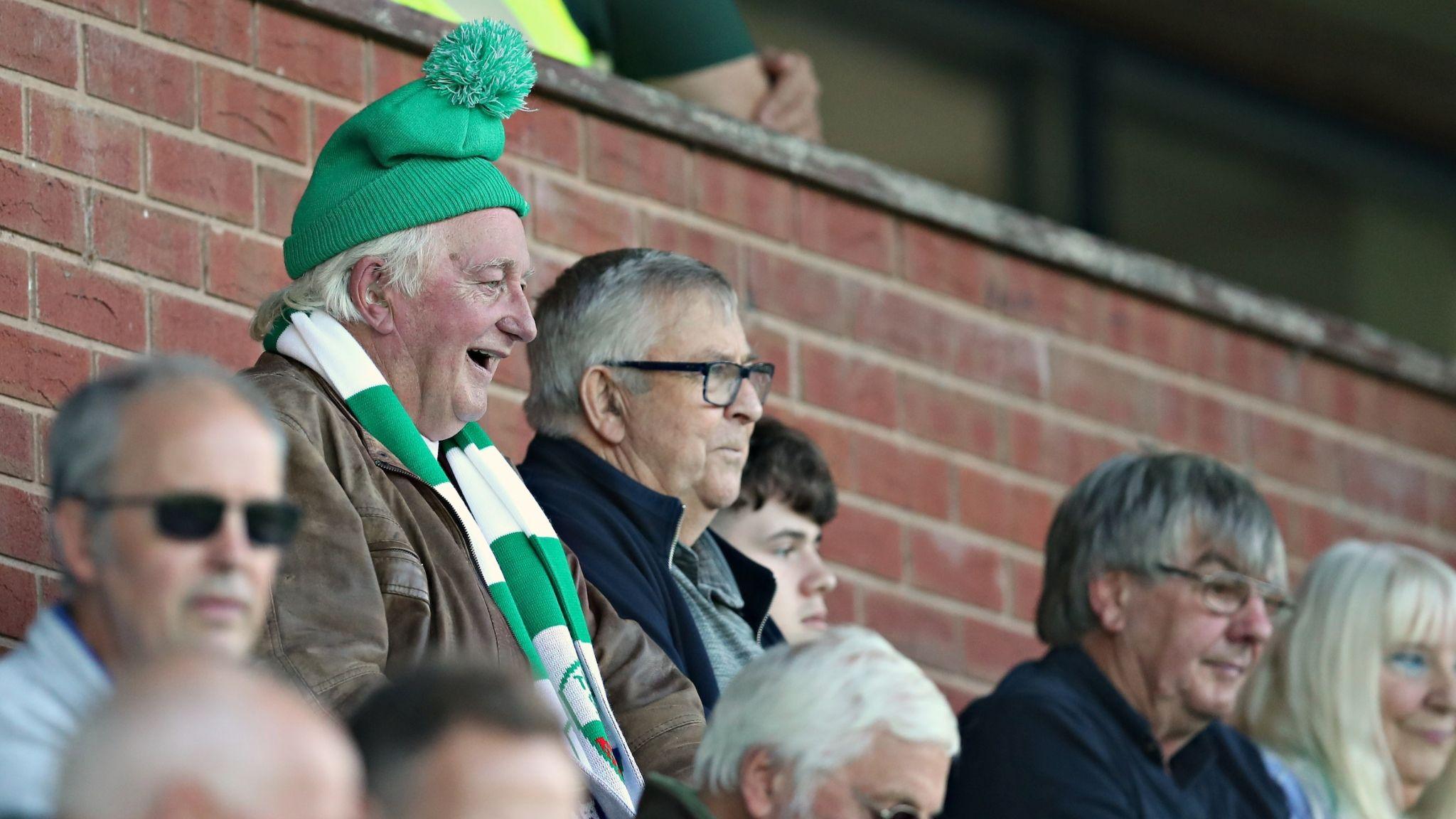
The question has sparked something of a debate amid the half dozen Barry Town fans, gathered around the same tables players had been relaxing at half an hour earlier.
“They’ve cracked the code of the Cymru Premier,” says Darren as the discussion around the subject of TNS gets going. “They spend big to win the league, and the more they win it, the more money they get.”
It prompts questions of whether the same could have been true of Barry themselves, once the big-money professional team before financial difficulty and the rise of a fan-backed phoenix club.
Amid the barbs of being an English team in the Welsh system, it’s reminded that Oswestry Town – the team TNS merged with in 2003 – were involved at the formation of the Football Association of Wales and supplied nine players to the first Wales team to play England in 1879
They had been in the Welsh top flight when their financial difficulty, coupled with TNS’ inability to develop Treflan to meet new licencing criteria, that saw the clubs combine and move to Park Hall.
With Harris’ business now sold to BT, they went there as The New Saints of Llansantffraid and Oswestry Town, to give them their full moniker.
And, as David Cole reminds as he shakes Craig Harrison’s hand in congratulations, they “keep flying the flag.”
With his white hair and warm smile, Cole has seen it all over 30 years with Barry. Now general secretary, just like he has offered support to TNS, he remembers when Harris was first to phone after the reborn club’s return to the top tier.
“He told me ‘we need you in this league’ – and after all, he had said when he came in that we were the team he wanted to compete with,” Cole says as he makes his way to the pitchside seats. “We were winning everything and people would say the same thing, that we were only successful because of money.
“And it was probably right, because now we haven’t got any and we’re not successful!
“Mike has been here a long time, and he’s put his money where his mouth is.”
Danny Redmond says there will be no pressure on The New Saints against Fiorentina.
As players retreat from their warm-ups on the artificial turf, there is a danger of the ground having more sponsorship hoardings than spectators in their seats.
“It’s our biggest single challenge,” says Williams of attempts to grow the fanbase. For all their critics, they are clearly trying to grow a community, with its well-being out-reach or free Christmas Dinners for elderly at the venue.
But there are still few fans though the door.
According to some feedback to one official, TNS’ dominance doesn’t help. It is March 2022 since they last lost a domestic game here.
“Some people don’t find it enjoyable being so one-sided,” they say.
The retired couple, 69 and 72, dressed for the occasion at the back of the main stand, don’t appear to be in agreement.
It’s tempting to wonder if Sue is making an ironic point as she reads ‘The Good Husband’ on her e-book, but with her green mac and blouse and scarf, she’s been joining Ian at Park Hall for the past decade.
“They’ve worked so hard for years, I was in tears when it happened,” says Ian of the European milestone, having started following the club since their relocation with Oswestry Town, his father’s local club.
Towards the barrier, stood alongside 10-year-old son Mitik as he waits for the chance to high-five players, Kalin is puzzled at the nature of the question.
“Why TNS? Because it is our team,” says Kalin, originally from Plovdiv in Bulgaria where he supported local team Botev. “There could be 10 fans or 10,000, this is our team and it is still football.”
Mitik has wanted to come to every match since first being introduced to the club through the community foundation’s work in local schools.
“We just need to find another hundred like him,” smiles Williams at another small step towards the aim.
One fan still hasn’t taken his seat by the time the teams walk out to Green Day’s ‘The Saints Are Coming’.
Five minutes in, Harris arrives. Jeans, trainers, grey blazer, a bundle of energy.
Pipedream
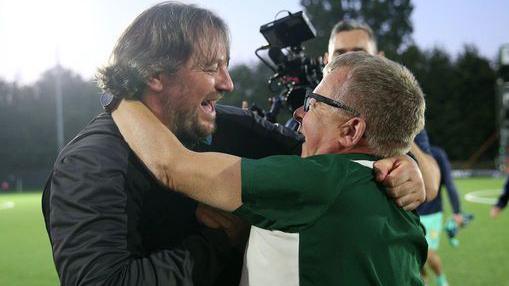
“Isn’t there something you can do on the back of this Gavin and Stacey thing?” Harris asks David Cole, mind instantly whirring away of possibilities as he chats with his Barry guest over the half-time buffet.
His involvement in Welsh football may well have started as self-promotion, but it is clear Harris wants the game in Wales to succeed, not just his team.
Short in stature but big on ideas, he cares little that his suggestions or opinions aren’t welcomed by all, but certainly cares about trying to improve as he watches his side try to improve on the one-goal lead at the start of the second half, relaxed as he regales while leaning on the barrier at the back of the new stand.
“I always want to win, but I don’t expect success,” he says as Adam Wilson scores a second, back from Bradford City on loan after leaving for the EFL last season. “But I do like attractive football. I want to be entertained. I’d much rather see a 4-3 win than a boring 1-0.”
It wasn’t always the case. He retells the story of how, in the immediate aftermath of his investment and the name change, TNS drew their opening seven games and lost the eighth 10-0 at Barry.
“They were the standard we wanted to get to,” he says. “And hopefully we can be the catalyst for others.”
That includes the group stage of Europe, an achievement he had long promised all those who had listen. Most, including old friend and manager Graham Breeze, had laughed.
“I told him it was a pipedream,” Breeze says of the ambition “Which he called to remind me after they qualified, of course.”
Breeze wasn’t the only one who had told Harris he had set targets too high.
“But I genuinely believed it,” the owner says, eyes fixed on the game as TNS continue to dominate. “Now we just have to work out how to win it!”
There have been frustrations over the years when domestic triumphs didn’t lead to competing in Europe. There have been 86 games played in Uefa competitions in all, but the new qualifying system and a final 3-0 aggregate win over Lithuanian side FK Panavezys three weeks ago has secured what he admits is a “surreal” realisation of a dream.
A dream that started in Llansantffraid.
“We would have been relegated even as champions if we didn’t meet the licencing criteria,” he says of the move.
“Perhaps we could have made sure the reserve team played there, but I’m glad there’s a legacy and the new team is doing well.”
But have TNS truly found a home? Does it not irk that all this investment, all this success, and still only a few hundred join him?
“Look, both Oswestry and Llansantffraid didn’t get big numbers,” he argues. “We have had as much as 600 here for games and it is slowly starting to happen.
“But honestly I don’t care how many, I care about them when they’re here, that they come and enjoy it.
“Anyway, it’s not me you should be asking; Sarah, tell this man what the club means to you.”
Harris has called over to the supporter with a lengthy green-and-white scarf stood a few feet away.
She pauses as she thinks about the best way to put her response. As well as supporting the club, Sarah washes the kits; shorts and socks separate from tops, and get the shirts out of the dryer and hung up as quickly as possible.
“It’s like a family,” she says, content with her answer, before pointing out another member at the opposite end of the ground.
Chrissie shares her own story of affinity with the club, stopping to look as Saints add two quickfire goals at the far end in the game’s dying stages. She had only gone to take her son to see a friendly against Wrexham at Llansantffraid. Almost a quarter of a century on - making the short hop over the border - and she’s still here.
As is Harris.
“He always wanted this, but I didn’t think it would happen,” Chrissie adds of the European adventure. “We got there – but he probably won’t stop.”
Flagbearers
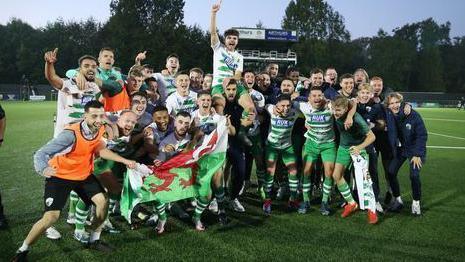
The winning run also continues.
“I was saying to the lads, you don’t understand how hard it is to play against TNS – you end up just sitting in and hoping,” says Sion Bradley, sat between admiring friends as he finishes his post-match pasta. Last season, he was the opposition, still part-time with Caernarfon and the league’s player of the year. Now he is enjoying being on the other side.
He admits the fandom is not quite the same as at his former club, where support is passed down the generations, but suggests the impending European campaign will help start something here.
Behind him, Harrison strides into the function room where there is a handshake from Harris. “That was good to watch,” he says, interrupting his conversation with Williams, the first chance they have had to discuss some of the many challenges and added planning reaching the group stage has brought.
It includes having to play home fixtures in Shrewsbury, the club all too aware of the optics of Wales’ representative playing games further into England. Cardiff, though, was both too far and too costly. As it had been in the past, Wrexham would have been the preferred choice, but the Racecourse has its own big games to stage these days and the FAW no hold over a suitable venue.
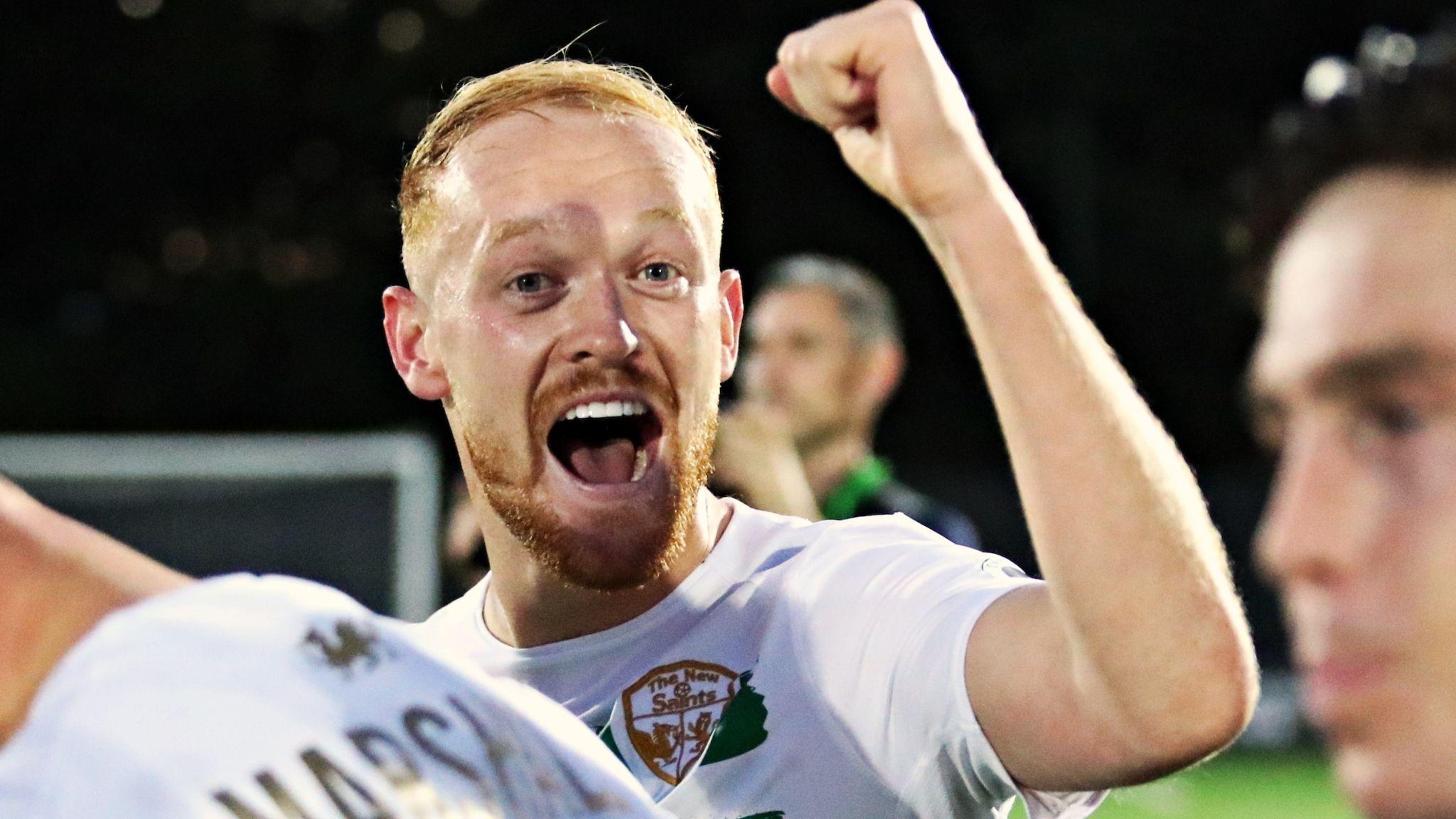
Ten days on and Park Hall is notably busier.
“You always get a good game against Bala,” says Graham, his Welsh dragon baseball cap giving away his length of support with a pin badge camouflage marking a multitude of European ties.
The academy and youth sides training on the same 3G surface finish, but plenty stay with young hopefuls asking parents for change to spend at the function room cafe.
The busier stands is not the only change. The cameras and added media have descended with the Fiorentina fixture now a week away.
And the unbeaten record is no more, Penybont having ended a 587-day undefeated league streak the previous Friday.
An old-school rattle and a greater sense of both atmosphere and jeopardy greet the sides as they walk out.
Two goals in injury time see TNS lose 3-2, their first home defeat in the league in two years. The first time they have lost back-to-back games since 2019.
Before finally emerging, admitting to being “shellshocked” and with a smile of what’s to come, Harrison keeps his players in the dressing room for an hour. Bala’s staff walk past remarking that it sounds rather quieter than it did earlier.
The travelling Bala contingent had not been, a reminder that the champions are the team most in Welsh football love to beat, for whatever the reason.
But they remain the flagbearers. They remain unique, this club of rebrandings and rebirths, one of two different starting points but a true sense of direction.
And as the family of fans file out onto the streets of TNS, be it Oswestry, Llansantffraid, or anywhere in between, they pass those images of European football and are reminded there’s room for one more at the most modern of clubs who have long been happy to write their own history.